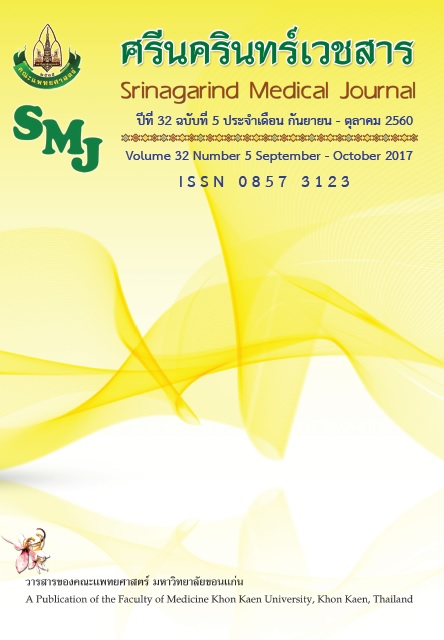Learning Needs Assessment on Family Medicine for Community Doctors and Nurses
Keywords:
Learning needs assessments, family medicine, primary healthcare, community doctors, community nursesAbstract
Background and objectives: The current numbers of Thai family doctors are inadequate and their works have not been sufficiently supported by their colleagues. There is a need to develop distant programs to keep updating knowledge and skills for rural and remote family doctors and provide education on family medicine to other healthcare professionals who work in the team in order to support the works of the family doctors. This study aimed to examine learning needs of community doctors and nurses on family medicine and preferences on educational methods.
Methods: A cross-sectional study was conducted with 1,350 doctors and nurses working in district hospitals and primary care centres in Khon Kaen and Sakon Nakhon provinces during October 2015 to March 2016. A self-administered questionnaire was used. Statistical analyses were performed using frequency, percentage, mean, standard deviation, Pearson correlation coefficient, one-way analysis of variance, and Pearson Chi-square.
Results: A total of 526 participants returned the questionnaire, giving a response rate of 38.9%. The samples of participating doctors and nurses were predominately female (89.2%). Their age ranged from 24 to 63 years (mean = 42.21, SD = 8.62) and years worked in the practice ranged from 1 to 40 years (mean = 19.86, SD = 9.07).The top three most needed topics of learning were English for healthcare professionals (74.0%), type 2 diabetes (52.3%) and hypertension (50.0%). In regard to the principles of family medicine, almost half of the participants (49.8%) had knowledge and skills, but were not confident in translating into the practice. Even though, four fifth of the respondents had no experience in a structured online learning before, the same proportions preferred this technique for their education.
Conclusions: The study provided a snap short of community doctor and nurse attitudes to distant learning program and their preferences on educational content and delivery styles. The information from this study will be used to guide the content included and level of information provided in the online program for primary healthcare professions.
การศึกษาความต้องการและความจำเป็นต่อการศึกษาต่อเนื่องด้านเวชศาสตร์ครอบครัวของแพทย์และพยาบาลปฏิบัติงานในชุมชน
อิสราภรณ์ เทพวงษา1*, ปัตพงษ์ เกษสมบูรณ์1, Radhakrishnan Muthukumar2
1หน่วยเวชศาสตร์ครอบครัว ภาควิชาเวชศาสตร์ชุมชน คณะแพทยศาสตร์มหาวิทยาลัยขอนแก่น
2บัณฑิตศึกษา มหาวิทยาลัยขอนแก่น
กับความต้องการของประเทศรวมทั้งเพื่อนร่วมงานยังขาดความเข้าใจในงานเวชศาสตร์ครอบครัว การศึกษาทางไกลจะส่งเสริมให้แพทย์เวชศาสตร์ครอบครัวและบุคลากรสาธารณสุขที่อยู่ห่างไกลได้เพิ่มพูนความรู้และทักษะในด้านเวชศาสตร์ครอบครัวเพื่อส่งเสริมและสนับสนุนการทำงานเป็นทีม การศึกษานี้มีวัตถุประสงค์เพื่อสำรวจความต้องการและความจำเป็นต่อการเพิ่มพูนความรู้ในด้านดังกล่าวรวมถึงรูปแบบการเรียนการสอนที่ต้องการ
วิธีการศึกษา: การศึกษาภาคตัดขวางศึกษาในแพทย์และพยาบาลทั้งหมดที่ปฏิบัติงานในโรงพยาบาลชุมชนและโรงพยาบาลส่งเสริมสุขภาพประจำตำบลของจังหวัดขอนแก่นและสกลนคร ในช่วงเดือนตุลาคม 2558 ถึง เดือนมีนาคม 2559 จำนวน 1,350 ราย และใช้แบบสอบถามชนิดตอบเอง วิเคราะห์ข้อมูลทางสถิติใช้ SPSS version 20.0 ใช้ค่า ความถี่ ร้อยละ ค่าเฉลี่ย ส่วนเบี่ยงเบนมาตรฐานPearson correlation coefficient, one-way analysis of varianceและ Pearson Chi-square
ผลการศึกษา: มีผู้ตอบแบบสอบถามกลับ 526 ราย คิดเป็นอัตราตอบกลับร้อยละ 38.9 เป็นผู้หญิงมากกว่าผู้ชาย (ร้อยละ 89.2) มีช่วงอายุระหว่าง 24 ถึง 63 ปี (mean = 42.21, SD = 8.62) และระยะเวลาการปฏิบัติงานตั้งแต่ 1-40 ปี (mean = 19.86, SD = 9.07) เนื้อหาที่ต้องการให้มีการสอนสามอันดับแรกได้แก่ ภาษาอังกฤษสำหรับบุคลากรสาธารณสุข(ร้อยละ 74.0) เบาหวานชนิดที่ 2 (ร้อยละ 52.3)และความดันโลหิตสูง (ร้อยละ 50.0) เกือบกึ่งหนึ่งของผู้ตอบแบบสอบถาม (ร้อยละ 49.8) มีความรู้และทักษะในหลักการเวชศาสตร์ครอบครัวแต่ไม่มั่นใจในการนำไปปฏิบัติถึงแม้ว่าสี่ในห้าของผู้ตอบแบบสอบถามไม่มีประสบการณ์ในการเรียนออนไลน์แต่ผู้ตอบแบบสอบถามสัดส่วนเดียวกันนี้ต้องการการเรียนรู้ผ่านวิธีนี้
สรุป: การศึกษานี้นำเสนอภาพรวมข้อคิดเห็นสำหรับรูปแบบ วิธีการและเนื้อหาต่อการศึกษาทางไกลของแพทย์และพยาบาลในชุมชน ซึ่งส่วนใหญ่ต้องการเพิ่มพูนความรู้ด้านเวชศาสตร์ครอบครัว ผลการศึกษาในครั้งนี้จะถูกนำไปใช้ในการพัฒนาเนื้อหาสำหรับการศึกษาทางไกลด้านเวชศาสตร์ครอบครัวผ่านโปรแกรมออนไลน์สำหรับบุคลากรสาธารณสุขในชุมชน




